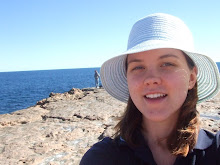Even a stone, and more easily a flower or a bird, could show you the way back to God, to the Source, to yourself.Yes and no. Putting aside "to the source, to yourself" part for the moment, I will go with yes, and here is Scriptural backing from Romans 1:20
For since the creation of the world God's invisible qualities—his eternal power and divine nature—have been clearly seen, being understood from what has been made, so that men are without excuse.We can see God's invisibly qualities, such as his power and goodness, by understanding that He has made the world. So stone, flowers, birds can all point towards the good and loving God who made them. But God is separate from his creation. How can God be part of what he has created? God is ruler above all creation, so he couldn't be a part of it. So that is where I disagree when Tolle suggests that the creation can point back to the divine within us. God is not within humanity. It is true he is in the Christian from Galatians 3:26... 4:6,
You are all sons of God through faith in Christ Jesus... Because you are sons, God sent the Spirit of his Son into our hearts.But this applies to those who put their faith in Christ Jesus. So then those who don't have their faith in Jesus, do not have the Holy Spirit, are not connected to God.
When you don't cover up the world with words and labels, a sense of the miraculous returns to your life that was lost a long time ago when humanity, instead of using thought, became possessed by thought.I did a little experiment: I pondered my mobile phone. I looked at it and experienced some childlike wonder at the shape and it's purpose and so on. Is that the purpose for my life? To block out thoughts and walk around experiencing the sense of miraculous as I revel in childlike wonder? It seems almost, anti-intellectual. To give him credit, he does add a little later that,
we have to use words and thoughts. They have their own beauty - but do we need to be imprisoned in them?but even if we are not imprisoned by them, he holds that,
the quicker you are in attaching verbal or mental labels to things, people or situations, the more shallow and lifeless your reality becomes, and the more deadened you become to reality.So I return again to my assertions that he is almost anti-intellectual.
To sum up this block of text, I agree that there is more outside of the physical realm and things have being that exist despite our names and labels for them, he's a bit odd when he claims that names and labels are part of the problem. I think, using them and having proper boundaries on such things is good. It helps us in our relationships. It helps us express ourselves. Although, I think in the next section, he's going to be attacking our sense of self... or maybe he's already done that and will be elaborating.

2 comments:
Comment: So that is where I disagree when Tolle suggests that the creation can point back to the divine within us. God is not within humanity. It is true he is in the Christian from Galatians 3:26.
Response: Tolle does state, and I agree, that God is the "source of all being", so in this sense one can recognize and come into contact with this source through his creation. That said ... one also has to have faith in Christ (not Jesus the person, but the Christ he embodied and manifested) to be liberated and return to the Father. The Christ is also within us as a potential waiting to be born, grow and become a Son of God. This requires faith and works and when one becomes "baptized into Christ" one becomes "clothed" with Christ. Christ is a radiation we are taken into and surrounded by when we open ourselves to it through faith and ennobled with works. We also have to die in Christ which means dying as to our old nature (ego-self in Tolle terms) and are reborn (no-self in Tolle terms or living by the will of God and not our ego-personality).
Comment: I agree that there is more outside of the physical realm and things have being that exist despite our names and labels for them, he's a bit odd when he claims that names and labels are part of the problem.
Response: This is a tough concept to understand unless one has directly experienced consciousness without thought. Tolle is not anti-mind or anti-intellectual, but only opposed to our "identification" with mind or intellect. Being controlled by it. When one is in a more natural, pure state of consciousness the mind is completely clear and experiencing the world directly without interference. When a thought is needed ... it arises from the mind, completes its task and then recedes into silence. Thoughts are only tools for working with the world, but silence is the natural, baseline condition of the mind when it is free from being controlled by thoughts. Labels, etc. are a characteristic of thought that removes us from direct perception of an object or the world as it is.
Hey this is AuthenticMystique from GodlyGals!
I enjoy your insight. I haven't read much by Tolle yet..but perhaps I will soon to look into this a little more. :)
Post a Comment